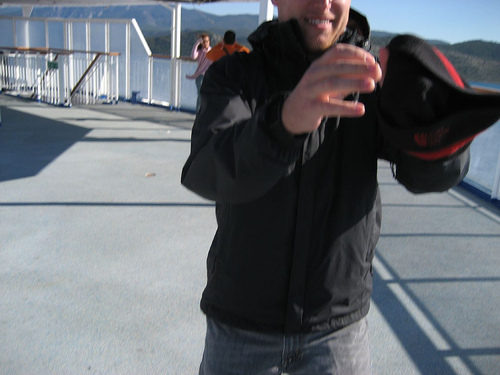
A few weeks before I last left Johannes- burg, a church I've been attending on Sunday evenings held a public forum of sorts, entitled "South Africa: Staying or Leaving?"
It was extremely well attended, if that tells you anything about the importance of the issue there, of late.
Emigration isn't a word you hear used a lot in the US. While immigration is a hot topic (one that even the presidential candidates must take position on), there simply isn't much focus on the opposite. Probably because there's not much reason to dwell on the possibility / idea of emigration - who would want to emigrate out of the US (although these words of mine may soon require a bit of adjusting, considering the economy of late)?
But emigration is a huge topic here. By some estimates, requests for it have risen over 400% in the last year alone in SA. If your not familiar with the reasons why, you can find them in this brief article. Speaking only as someone who's lived in ZA for the last 7 months or so, the article is pretty accurate. Storms are brewing there.
Enter the conference. The pastor gave some introductory notes:
1) Why are people wanting to leave South Africa? Four main reasons were cited:
- Rampant crime and the general fear of it
- Married people / parents worrying for their spouses' and childrens' safety, also white people having to worry if there will be jobs for their children, considering the pervasive affirmative action now in play
- ZA's shaky economic outlook
- ZA's perhaps-even-more-prominent shaky political outlook - while many people are appalled with Zuma's election to president of the ANC, it doesn't as of yet look as though there's much that will stop him from ruling the country come next year.
The pastor at this point stopped to recognize the fact that everyone has to draw the line somewhere on how much they are willing to stay and endure, the question is just where do you draw that line.
2) What does the Bible have to say about where we should live? The answer is: very little. Scripture is more primarily focused on how and why we should live, than it is where. References:
- Genesis 12:1 - the first big move (God prompts Abram)
- Ruth 1:1 - Elimelech's move due to famine (Ruth's father-in-law)
- Matthew 2:13-15 - Jesus' own family's emigration from the promise land, to escape persecution (they return in 2:19)
- Acts 8:1 - the church persecuted and scattered, but those who stayed and those who left kept on preaching the gospel
- Acts 18:1-3: Priscilla and Aquilla - wealthy early Christians with homes mentioned in Corinth, Ephesus, and also Rome (see Romans 16:3).
3) What is the church's position? Overall, the position was to encourage people to stay in ZA, but more importantly the church wanted to stress that staying vs. leaving is not the central issue - the main focus should be on how and why you live.
After the introductory notes, a panel was asked on stage, consisting of a white man who had emigrated (somewhat ironically, I thought) to Zimbabwe with his family, a white couple from Zimbabwe that had decided to stay there, and a black mother of a family that had decided to stay in ZA. They all had interesting stories, especially the couple from Zimbabwe.
They had built a farm there in the 90's, raised their kids, and were employing a large number of local people on their farm (ostrich, cattle, sheep, also a shoe factory and clothing factory for both local sale and export, that they operated there, on their farm). Then, in the (government-supported) riots of 2003, one night their house was surrounded, and by the next morning - when they could get police escort to the local magistrate, they were told by the magistrate that they had one hour to take what they could from the house, which they no longer owned, on the farm that was no longer theirs. When they got back, all of their livestock was gone, and most of the property that hadn't been stolen had been ransacked. The new "owner" was there to dictate to the police escorts which items they could and could not take with them. And then they had nothing.
Fortunately they had the support of their local church to get them back on their feet, but it was quite fascinating to hear from a family that went through this, considered leaving, and then realized that they couldn't escape suffering in this life, and felt called to stay in Zimbabwe (they are still living there now, rebuilding their lives, farming, and trying to create more jobs for the locals).
Anyway, here are a few of my other random notes from that part of the night:
- When you give people jobs, you a) inherently give them a manner of dignity, and b) earn the right to influence them, to get involved in their lives. Supplying people with employment can be a powerful means of community building and eventually witness as well.
- The safest place in the world is to be in God's will. (I heard something similar on the first Sunday I went to the Every Nation's church I've since been attending on Sunday mornings in Joburg - the pastor said that if ZA is where God wants him and his family to be, there is no safer place for them in the world.)
- The Zimbabwe couple considered moving to Australia for a while, a place where some of their emigrating white friends had moved. What they saw there, however, was a life so easy to live that you "don't need God anymore." That was a fascinating and deeply convicting statement.
The pastor closed out the evening with 3 key principles from Scripture:
1) The Sovereignty of God
- Romans 8:28: "And we know that in all things God works for the good of those who love him, who have been called according to his purpose.") - while the verse is not for everyone, He yet works in all things for his children, for their good (the good, which is contained in v29).
- God's ultimate concern is not our comfort but our conformity to Christ. And nothing can separate us from His love (v37-39).
- Ps. 139: "...all the days ordained for me" - Christians are immortal until called home by God. Until that point: untouchable.
2) The Lie of Emigration
- People hate the insecurity and crime and politics with good reason, however there is no safety on this side of Eden. Sin and Satan are no less active in Melbourne than they are in Midrand, or Manhattan for that matter. You can move anywhere and serve God, but don't think that you can escape suffering.
- (Herein I was reminded instantly of the message behind M. Night Shyamalan's The Village, and also the quote on suffering that I will close this blog post with.)
- The only safety and security to be found on this earth is with Christ. And with Christ, there is suffering.
3) The Wasted Life
- Ease and comfort can never be a purpose for living - they are only a recipe for tragedy. We are made for a purpose beyond comfort: wherever you live you must make a difference for Christ.
- The Bible does not give us guidance on where to live. A story by John Piper was then quoted which I will semi-quote / paraphrase from sources I found online:
...and then, as many of you know, Ruby Eliason and Laura Edwards died this week in Cameroon in a car accident - Ruby in her eighties and Laura in her seventies. Ruby gave all her life in medical missions among the poor. Laura, a doctor who practiced in India for many years and then here in the Cities, was giving her retirement for the bodies and the souls of the poor in Cameroon. Both died suddenly when their car went over a cliff.
Was that a tragedy? Well, in one sense all death is tragic.
[But] I will tell you what a tragedy is. I will show you how to waste your life. Consider this story from the February 1998 Reader’s Digest: A couple ‘took early retirement from their jobs in the Northeast five years ago when he was 59 and she was 51. Now they live in Punta Gorda, Florida, where they cruise on their 30-foot trawler, play softball and collect shells...’ Picture them before Christ at the great day of judgment: ‘Look, Lord. See my shells.’ That is a tragedy.
- The purpose of life is not self-fulfillment but self-forgetfulness. As Jesus said, "Whoever wants to save his life will lose it..."
- One person can change the world, you don't have to be a Nelson Mandela or a William Wilberforce, you need only follow Christ
For those of you who aren't already aware, I'm seriously considering the possibility of staying in South Africa on a more long-term basis. I won't yet say "permanent" - and the US will always be "home" to me - but it is something I on my mind. I'm searching for discernment on the issue, but I feel that being there might help me stay in better touch with the contacts I have made / am making in the relief and development sector, where I would like to be working, long term, in Africa.
I remain realistic and alert and try to be wise on the issue of where I should live. But at the end of the day, I am immortal until I'm not supposed to be anymore, and where is not as big an issue as why.
At the onset of the disease...most of our brother Christians showed unbounded love and loyalty, never sparing themselves and thinking only of one another. Heedless of danger, they took charge of the sick. Attending to their every need and ministering to them in Christ, and with them departed this life serenely happy; for they were infected by others with the disease, drawing on themselves – the sickness of their neighbors and cheerfully accepting their pains. Many, in nursing and curing others transferred their death to themselves, and died in their stead... – Rodney Stark, The Rise of Christianity















2 comments:
thanks for the post. it's both helpful and encouraging. seeing others wanting to follow Jesus with all they are, no matter the cost (whether it is seemingly big or small at the time) always helps me to strive to do the same. so, thanks!
This post makes me think. I really like this: "The safest place in the world is to be in God's will."
Post a Comment